Syria conflict: Jordanians 'at boiling point' over refugees
- Published
King Abdullah: "I think it's gotten to a boiling point"
King Abdullah of Jordan says his country is at "boiling point" because of an influx of hundreds of thousands of Syrian refugees.
Ahead of a donor conference on Syria, the king told the BBC that there was enormous pressure on Jordan's social services, infrastructure and economy.
"Sooner or later, I think, the dam is going to burst," he warned.
He said the international community would have to offer more help if it wanted Jordan to keep taking refugees.
The UN is seeking $7.7bn, external (£5.4bn) to fund aid operations for 22.5 million people in Syria and neighbouring countries next year. However, only 43%, external of its 2015 appeal for $2.9bn was funded.

Analysis - Lyse Doucet, BBC News, Amman
For decades Jordan welcomed people escaping wars on its borders - Palestinians, Iraqis, and now so many Syrians they make up nearly 20% of the population.
"For the first time," King Abdullah says, "we can't do it any more."
Schools, hospitals, jobs are under pressure. The king is going to London to drive a hard bargain. If Europe's leaders expect him to create jobs for Syrians so they stay in the region, he expects them to provide long-term assistance to also provide jobs for Jordanians. That's what the London Conference is promising Syria's neighbours.
In Jordan, only 1% of Syrian refugees now have work permits. The king knows opening up the job market would be deeply unpopular unless he can also offer opportunities for his own people.
Years ago, he famously said Jordan was stuck between "Iraq and a hard place". It's far harder now, with thousands of Syrians still arriving at his border.

Jordan is hosting 635,000 of the 4.6 million Syrians registered as refugees with the UN. The government says more than one million other Syrians are living there, including those who arrived before the uprising erupted in 2011.
In his interview with the BBC, King Abdullah said Jordanians were suffering as a result of the influx, with 25% of the state budget spent on helping refugees, public services under strain and many struggling to find jobs.
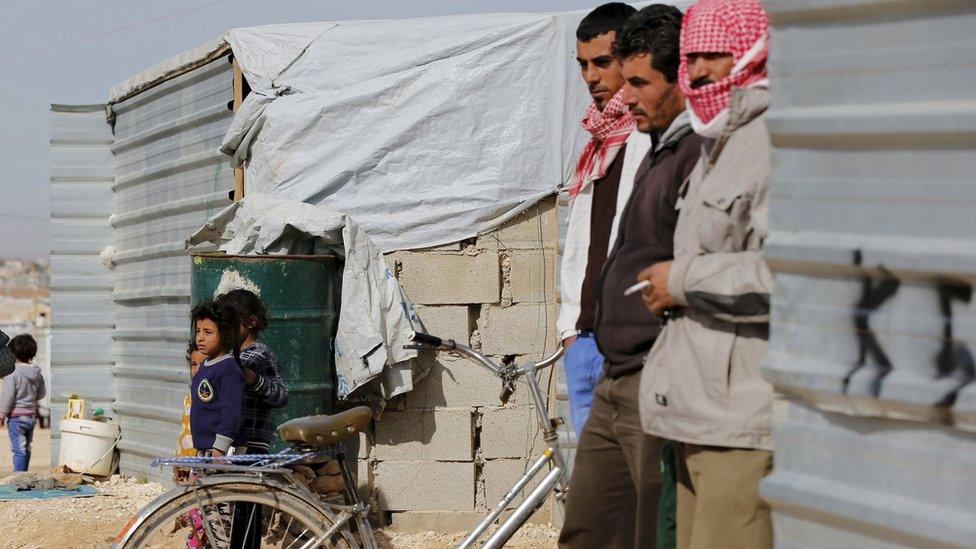
Jordan is hosting 635,000 of the 4.6 million Syrians registered as refugees with the UN
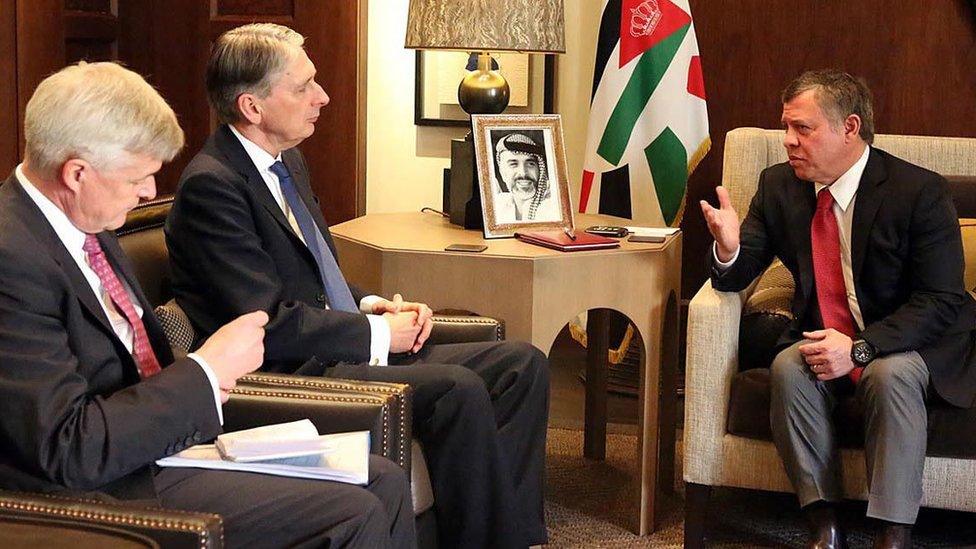
UK Foreign Secretary Philip Hammond, centre, promised on Monday to step up support for Jordan
"The psyche of the Jordanian people, I think it's gotten to boiling point," he said.
"It hurt us when it comes to the educational system, our healthcare," he added. "Sooner or later, I think the dam is going to burst and I think this week is going to be very important for Jordanians to see, is there going to be help - not only for Syrian refugees, but for their own future as well."
He noted it had taken the arrival of more than a million migrants and refugees in Europe for European countries to understand the pressure Jordan felt.
King Abdullah of Jordan speaks to the BBC's Lyse Doucet about the refugee crisis and his hopes that peace talks in Geneva can resolve the conflict in Syria
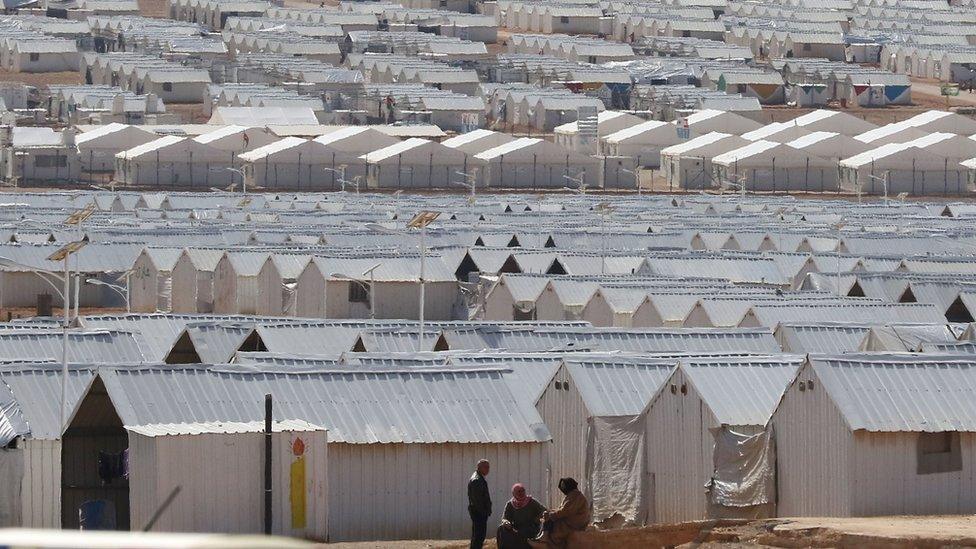
A quarter of Jordan's state budget is spent on helping refugees, King Abdullah says
"They realise that if they don't help Jordan, it's going to be more difficult for them to deal with the refugee crisis," he said, suggesting that Jordan might not be able to host any more Syrians.
The UK, Germany, Norway, Kuwait and the UN, which are hosting Thursday's donor conference in London, say, external the international community must step up its efforts to help the 13.5 million vulnerable and displaced people in Syria and the millions who have fled abroad.
They aim to raise significant new funding, identify long-term funding solutions, and address the longer term needs of those affected by the crisis by identifying ways to create jobs and provide education.
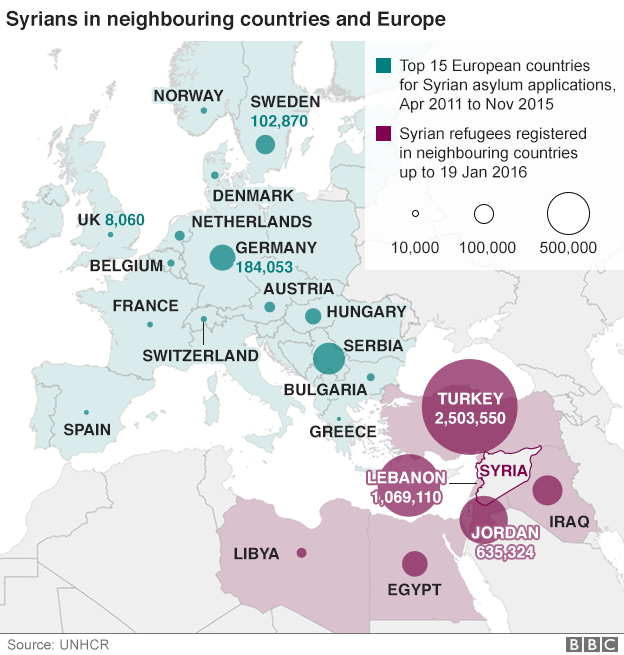
On Monday, officials told Reuters news agency that the European Union would promise €2bn ($2.2bn; £1.5bn) in aid at the conference. It pledged €1.1bn at the last gathering in Kuwait a year ago.
King Abdullah rejected criticism from the international community over Jordan's reluctance to admit some 16,000 Syrian refugees who are stranded in a remote desert area on its northern border.
He asserted that there were "elements" of the so-called Islamic State (IS) group among the refugees, many of whom have fled areas controlled by the jihadist group, and that the 50 to 100 admitted each day were "going through a strong vetting system".
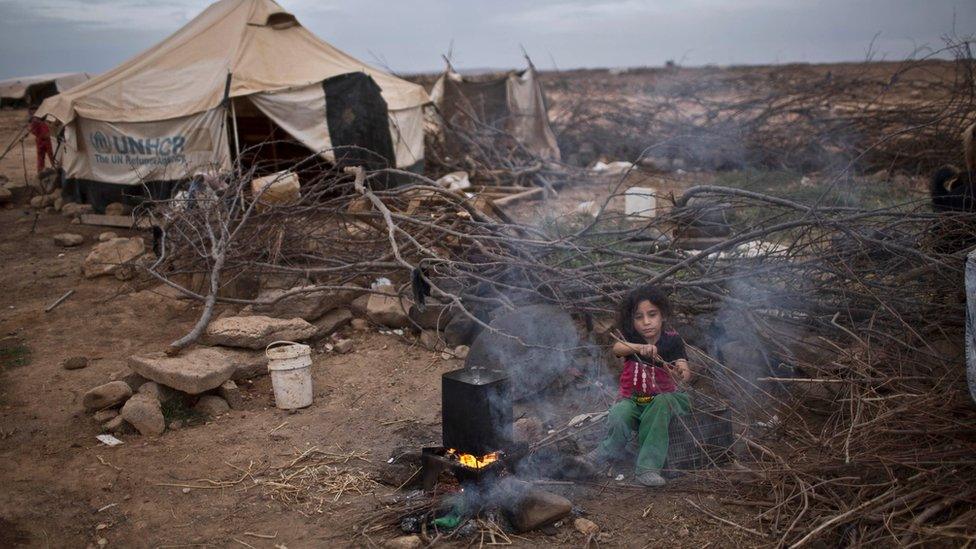
The UN says 16,000 refugees are stranded on the Jordanian border in deteriorating conditions
"If you want to take the moral high ground on this issue, we'll get them all to an airbase and we're more than happy to relocate them to your country, if what you're saying is there's only 16,000," he added.
The UN has warned that children and other vulnerable people are among those stranded in deteriorating conditions at the border, and that their lives are at risk.
King Abdullah said he hoped that the threat posed by IS to the world would convince Syrian government and opposition representatives attending talks in Geneva, as well as their backers in Moscow and Washington, of the urgent need for a political solution to the conflict in Syria.